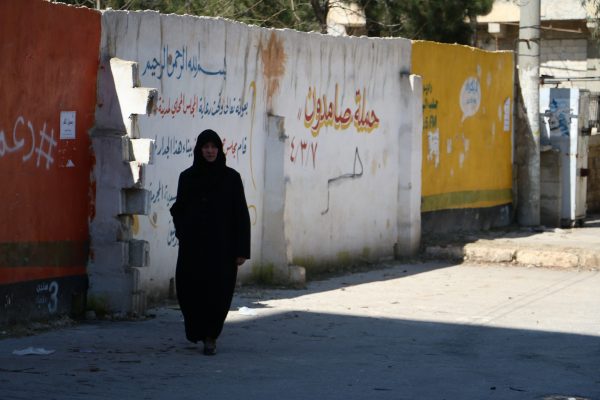A Prisoner of His Heart

A woman walking through the Salah al-Din neighbourhood .
After our village was shelled, my family and I were forced to flee, and we ended up in Alweibdeh village in the Idlib countryside.
A newlywed woman named Nimah lived next to us. She was nice, and we became friends. I used to go to her house to drink coffee, even though I was a little too young for such drinks, but the war had made everyone grow up fast.
One time while I was visiting Nimah, her husband came home with his brother. They said hello and I felt something strange towards the brother, whose name was Mohammed. I had never felt like this before. Even the way he was looking at me felt wonderful. Still, I quickly excused myself and and left because my father didn’t like his daughters spending time with men we didn’t know.
The next day, I went to visit Nimah as usual. While we were chatting, I asked her about Mohammed. I was surprised to hear that he was married – but then she told me that he and his wife were in the process of separating.
I felt relieved because he was about to divorce his wife, but then I immediately I felt ashamed of myself. What was wrong with me? Had I fallen for him? Maybe this was what they called love at first sight.
Nimah told me that Mohammed had been married for just two months, but he and his wife didn’t get on well with each other. She also told me that he was diabetic, but that didn’t change a thing for me.
A few days later, I learned that Mohammed’s divorce had come through. I was so relieved. He then began visiting his brother’s house very often, and I didn’t leave when he did even though my father didn’t approve.
I began to feel so connected to him. I loved him more and more each day. I felt safe when he was around.
One day, Mohammed told me he wanted to ask for my hand in marriage. I was thrilled.
He told me about his previous marriage, and that he had been diabetic since childhood. He also told me that he had worked in a construction site in Damascus until he was arrested by the regime. His only crime had been that he lived right next to an army checkpoint. Since then, he had become a nurse so that he could help people.
The suffering Mohammed had experienced, and his determination to overcome his difficulties, made me love him even more.
He asked me to make a date when he could visit our house with his family so as to ask for my hand in marriage. When that day came, I felt like I could fly with joy. Mohammed told my father everything about him, without shame; his previous marriage, his illness, his arrest, and that he was displaced and poor. He didn’t lie and or hide anything from my father.
My father called me after Mohammed and his family left, and told me that he was going to forbid the match because my suitor was both poor and and diabetic. I spent days crying and begging my older sister and stepmother to convince my father. I refused to marry anyone apart from Mohammed.
Finally, my father agreed. I called Mohammed and told him to come with his family so that we could get officially engaged. Everything went well and we got married.
I am happy with Mohammed, this young gentleman who suffered so much and escaped the regime’s prison to make me a prisoner of his own heart. I am grateful to Mohammed for all the love he gives me.
Zahrat al-Ghab, 16, is from the Idlib countryside. She holds a middle school certificate and is looking for a job to help support her household.
